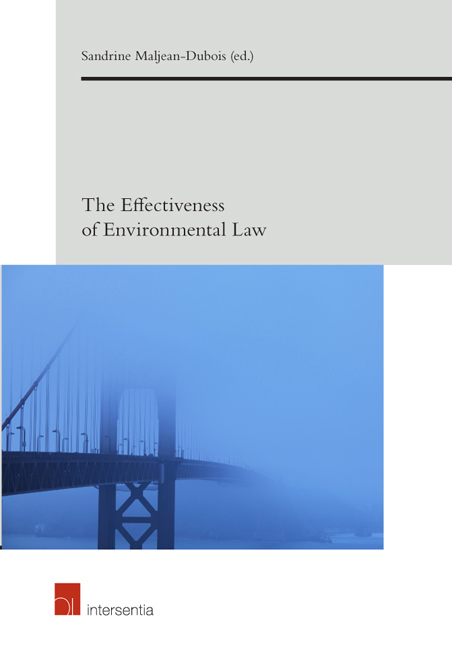Book contents
- Frontmatter
- Preface
- Contents
- Introduction. The Effectiveness of Environmental Law: A Key Topic
- Part 1 Measuring and Assessing Effectiveness
- Part 2 Improving Effectiveness
- Better Legislation
- Better Implementation
- Chapter 11 Towards More Effective Protection of Water Resources in Europe by Improving the Implementation of the Water Framework Directive and the Aarhus Convention in the Netherlands
- Chapter 12 Environmental Inspectors and Public Prosecutors. Is Sharing Information Always Useful?
- Chapter 13 Environmental Damage Caused by Oil Exploitation in Brazil. The “Conduct Adjustment Agreement” (TAC) as a Means to Circumvent Civil Liability Ineffectiveness
Chapter 11 - Towards More Effective Protection of Water Resources in Europe by Improving the Implementation of the Water Framework Directive and the Aarhus Convention in the Netherlands
from Better Implementation
Published online by Cambridge University Press: 27 September 2018
- Frontmatter
- Preface
- Contents
- Introduction. The Effectiveness of Environmental Law: A Key Topic
- Part 1 Measuring and Assessing Effectiveness
- Part 2 Improving Effectiveness
- Better Legislation
- Better Implementation
- Chapter 11 Towards More Effective Protection of Water Resources in Europe by Improving the Implementation of the Water Framework Directive and the Aarhus Convention in the Netherlands
- Chapter 12 Environmental Inspectors and Public Prosecutors. Is Sharing Information Always Useful?
- Chapter 13 Environmental Damage Caused by Oil Exploitation in Brazil. The “Conduct Adjustment Agreement” (TAC) as a Means to Circumvent Civil Liability Ineffectiveness
Summary
INTRODUCTION
The Netherlands is a country that lives on water and has a long and fascinating history of water management. Yet, water quality in the Netherlands is not good, and a recent prediction made by the Netherlands Environmental Assessment Agency (Planbureau voor de Leefomgeving), shows that by 2027 between 95% and 60% of Dutch waters will not fulfil the standards established under the Water Framework Directive. Clearly, despite longstanding Dutch experience in water management, the effectiveness of implementation of EU Water law can still be improved upon.
In this chapter, we will provide an initial set of recommendations to improve the effectiveness of European water law by way of a better implementation of the substantive requirements of the Water Framework Directive and the procedural requirements of the Water Framework Directive and the Aarhus Convention in the Dutch legal order. Effective environmental policies, as laid down in EU environmental law, require both substantive and procedural elements. Only if both are implemented well can we speak of effective environmental or water legislation and protection.
Indeed, despite the Ministry having repeated its mantra that Dutch water law is in line with the Water Framework Directive part of the ineffectiveness highlighted above can be attributed to the fact that the Dutch implementation of the Directive diverges from the manner in which the Court of Justice of the European Union (ECJ) interprets the Water Framework Directive. Furthermore, shortcomings could derive from the manner in which the Netherlands implements the Aarhus Convention.
In the so-called Weser case, rendered in July 2015, the ECJ clarified that the environmental goals established under Article 4 of the Directive are an obligation binding upon each phase of a decision-making process; hence, at the level of plans and programmes as well at the level of decisions concerning specific projects. There is, therefore, a direct linkage between the environmental goals of the Directive and the decision to authorise or refuse the development of a specific project that would deteriorate the quality of a specific water body covered by the Directive. Moreover, the Weser case clarified what ‘deteriorating’ means under the Directive.
- Type
- Chapter
- Information
- The Effectiveness of Environmental Law , pp. 243 - 270Publisher: IntersentiaPrint publication year: 2017



